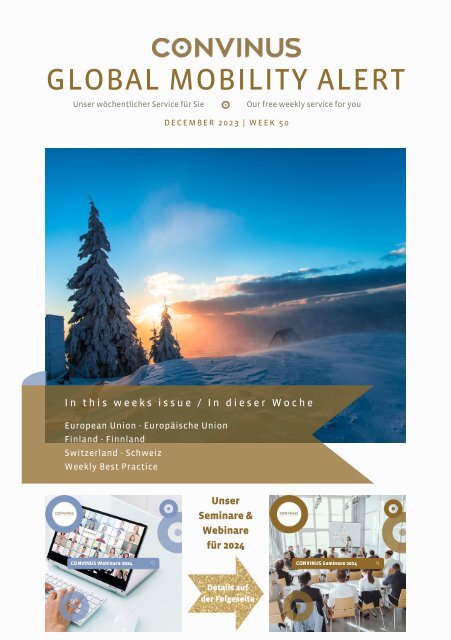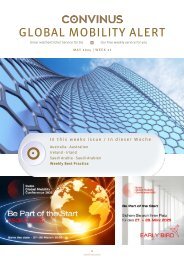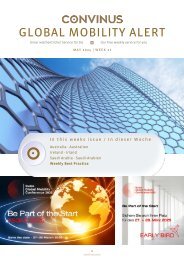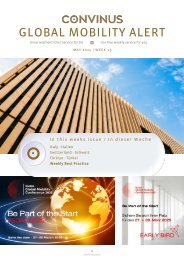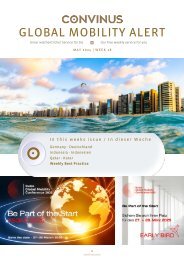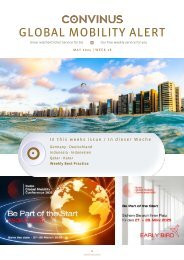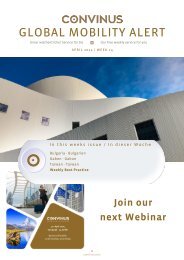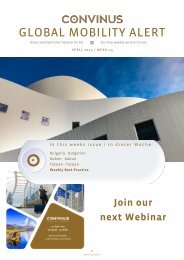CONVINUS Global Mobility Alert - Week 50.2023
You also want an ePaper? Increase the reach of your titles
YUMPU automatically turns print PDFs into web optimized ePapers that Google loves.
GLOBAL MOBILITY ALERT<br />
Unser wöchentlicher Service für Sie Our free weekly service for you<br />
D E C E M B E R 2 0 2 3 | W E E K 5 0<br />
I n t h i s w e e k s i s s u e / I n d i e s e r W o c h e<br />
European Union - Europäische Union<br />
Finland - Finnland<br />
Switzerland - Schweiz<br />
<strong>Week</strong>ly Best Practice<br />
Unser<br />
Seminare &<br />
Webinare<br />
für 2024<br />
Details auf<br />
der Folgeseite
<strong>CONVINUS</strong><br />
Webinare & Seminare<br />
mit Zertifikat für Ihren<br />
Karriere-Booster im<br />
Bereich <strong>Global</strong> <strong>Mobility</strong><br />
Auf folgendes können Sie sich verlassen:<br />
Erstklassige Referenten<br />
Topaktuelle Themen und Praxisfälle zur<br />
anschaulichen Darstellung<br />
Autodidaktisch sehr gut aufbereitete<br />
und ausführliche Foliensätze<br />
Flexibilität (nehmen Sie an einem x-<br />
beliebigen Ort mit Ihrem Laptop/PC teil)<br />
Geringer Zeitaufwand (Webinare 60<br />
Minuten und Seminare 180 Minuten)<br />
Günstige Massnahme zur Fortbildung
S h o r t N e w s D e c e m b e r 1 4 , 2 0 2 3<br />
Switzerland-EU: Digitalization of Schengen visas - Federal Council opens consultation procedure<br />
The Federal Council is opening the consultation on the digitalization of Schengen visas, as Schengen applications are to be<br />
submitted in digital form on a uniform European platform in the future. However, this platform has yet to be developed.<br />
The consultation ends on March 22, 2024. The European visa application platform is scheduled to go live in January 2026;<br />
however, Switzerland is not planning to connect to it before 2028.<br />
At the same time, on December 8, 2023, the Federal Council also decided to amend the Ordinance on Entry and Visa<br />
Issuance to enable digital visas in the form of a barcode in addition to conventional paper visa stamps. This amendment<br />
will enter into force on February 1, 2024 -for both national and Schengen visas.<br />
Finland: Finland Extends Tax Benefits for Skilled Expats to 7 Years<br />
The Special Expatriate Tax-at-Source Regime in Finland is changing to enhance its effectiveness in attracting skilled labor.<br />
The maximum duration of the regime is being extended from 48 months to 84 months (seven years), specifically for<br />
employees starting work in Finland on or after January 1, 2024.<br />
Employees who previously received a Special Expatriate Tax-at-Source Card, valid beyond December 31, 2023, can apply for<br />
a new card from the Tax Administration to extend the regime's total applicability to 84 months. This affects both future<br />
employees arriving in Finland after 2024 and those who arrived between 2020 and 2023, provided they remain under the<br />
regime after December 31, 2023. The application for the new card must be submitted within 30 days of the original card's<br />
expiration, contingent on the employee continuing to meet the criteria for the regime's applicability.<br />
Switzerland: Job registration requirement 2024 - fewer professions affected<br />
The number of reportable occupations will continue to fall in 2024 - only 3.2% of the working population will still work in<br />
reportable occupations. Cleaning staff and unskilled workers in offices, hotels, and other establishments will no longer be<br />
subject to registration. The occupation with the highest number of people subject to registration in 2024 will be unskilled<br />
workers in construction. The list of reportable occupations is updated annually by the Federal Department of Economic<br />
Affairs, Education and Research in the 4th quarter and is based solely on the unemployment rate of an occupation. The new<br />
ordinance will enter into force on January 1, 2024. Further information is available at www.arbeit.swiss.<br />
3<br />
convinus.com
K u r z n a c h r i c h t e n 1 4 . D e z e m b e r 2 0 2 3<br />
Schweiz-EU Digitalisierung von Schengen-Visa - Bundesrat eröffnet Vernehmlassung<br />
Der Bundesrat eröffnet die Vernehmlassung zur Digitalisierung von Schengen-Visa, denn zukünftig sollen die Schengen-<br />
Anträge in digitaler Form auf einer einheitlichen europäischen Plattform eingereicht werden. Diese muss allerdings erst<br />
noch entwickelt werden. Die Vernehmlassung endet am 22. März 2024. Die Inbetriebnahme der europäischen<br />
Visumantragsplattform ist für Januar 2026 anvisiert; die Schweiz plant ihre Anbindung jedoch nicht vor 2028.<br />
Parallel dazu hat der Bundesrat am 8. Dezember 2023 auch eine Anpassung der Verordnung über die Einreise und die<br />
Visumserteilung (VEV) beschlossen, um digitale Visa in Form eines Strichcodes neben den herkömmlichen Visumsmarken<br />
auf Papier zu ermöglichen. Diese Änderung tritt ab dem 1. Februar 2024 sowohl für nationale als auch Schengen-Visa in<br />
Kraft.<br />
Finnland erweitert Steuervorteile für qualifizierte Expatriates auf 7 Jahre<br />
Das Sondersteuerregime für Expatriates in Finnland wird geändert, um die Effektivität bei der Anwerbung qualifizierter<br />
Arbeitskräfte zu steigern. Die maximale Dauer des Regimes wird von 48 Monaten auf 84 Monate (7 Jahre) verlängert und das<br />
vor allem für Mitarbeiter, die ab dem 1. Januar 2024 in Finnland arbeiten werden. Mitarbeiter, die zuvor eine spezielle<br />
Expatriate-Quellensteuerkarte erhalten haben, die über den 31. Dezember 2023 hinaus gültig ist, können beim Finanzamt<br />
eine neue Karte beantragen, um die Gesamtgültigkeit des Expatriate-Regimes auf 84 Monate zu verlängern. Dies betrifft<br />
sowohl künftige Arbeitnehmer, die nach 2024 nach Finnland kommen, als auch solche, die zwischen 2020 und 2023 nach<br />
Finnland kommen, sofern sie nach dem 31. Dezember 2023 unter die Regelung fallen. Der Antrag auf die neue Karte muss<br />
innerhalb von 30 Tagen nach Ablauf der Originalkarte eingereicht werden, vorausgesetzt, der Mitarbeiter erfüllt weiterhin<br />
die Kriterien für die Anwendbarkeit der Regelung.<br />
Schweiz: Stellenmeldepflicht 2024 – Weniger Berufe betroffen<br />
Die Anzahl der meldepflichtigen Berufsarten sinkt auch im Jahr 2024 weiter - nur noch 3.2 % der Erwerbstätigen arbeiten in<br />
meldepflichtigen Berufen. Nicht mehr meldepflichtig werden das Reinigungspersonal, Hilfskräfte in Büros, Hotels und<br />
anderen Einrichtungen sein. Die Berufsart mit den meisten Meldepflichtigen im Jahr 2024 werden Hilfsarbeitskräfte auf<br />
dem Bau sein.<br />
Die Liste der meldepflichtigen Berufsarten wird jährlich vom Eidgenössischen Departements für Wirtschaft, Bildung und<br />
Forschung (WBF) im 4. Quartal aktualisiert und basiert ausschliesslich auf der Arbeitslosenquote einer Berufsart. Diese<br />
neue Verordnung tritt am 1. Januar 2024 in Kraft. Weitere Informationen sind auf www.arbeit.swiss verfügbar.<br />
4<br />
convinus.com
Best Practice<br />
Switzerland: Deduction of Swiss withholding tax on foreign payroll in practice<br />
Employees, who have an employment contract with a Swiss company but live abroad and mainly work there, are generally<br />
subject to tax at their place of residence and work. The same applies to employees who have a foreign employment contract,<br />
but for whom the Swiss assignment organization is deemed to be the so-called de facto employer.<br />
Swiss withholding tax must be deducted for the Swiss working days of these employees. These are calculated based on the<br />
exact days worked in Switzerland, marital status, religious affiliation, and income using the withholding tax tables of the<br />
respective canton.<br />
Depending on the canton and the size of the company, these withholding tax settlements are due monthly, quarterly, or<br />
even annually. It is the responsibility of the Swiss company to calculate the Swiss withholding tax correctly and pay it to the<br />
withholding tax office.<br />
However, as the employee generally owes the taxes, the company must reclaim these withholding taxes from the employee.<br />
Depending on the country or foreign payroll, this is not entirely straightforward and must be evaluated on a case-by-case<br />
basis. We will, therefore, give you 3 examples of countries in which Swiss withholding tax is handled quite differently by the<br />
foreign payroll.<br />
France<br />
French payroll is surprisingly pragmatic and uncomplicated when it comes to deducting Swiss withholding tax. Swiss<br />
withholding tax can simply be deducted from the employee's French salary. The French income tax deductions remain<br />
unchanged.<br />
To avoid double charges for the employee due to French income taxes and Swiss withholding taxes, the employee is<br />
responsible for offsetting this later in their French tax return.<br />
Germany<br />
There are various options for reflecting the Swiss withholding tax deduction on the German payroll. One simplified option is<br />
to initially define a fixed number of Swiss working days per month. The German wage tax is then reduced based on these<br />
fixed Swiss working days; the Swiss withholding tax is deducted instead. Before the end of the year, the German payroll is<br />
then corrected based on the actual number of Swiss working days per month and the actual Swiss withholding tax.<br />
Compared to the procedure described above in France, this has the advantage that the employee does not have a double tax<br />
burden on the Swiss working days during the current year and does not have to wait until the correction is made as part of<br />
the income tax return.<br />
5<br />
convinus.com
Best Practice<br />
Poland<br />
The Polish payroll is consistently persistent when it comes to deducting Swiss withholding tax and only allows this if the<br />
company can prove that it has paid the taxes to the Swiss withholding tax office. Otherwise, no deduction of Swiss<br />
withholding tax from the Polish payroll is permitted.<br />
This is particularly problematic for the Swiss company if the withholding tax contributions are significant and the invoice is<br />
not issued promptly by the competent Swiss tax office so that no proof can be provided within a reasonable period.<br />
Conclusion<br />
Be careful when deducting withholding tax from your foreign payroll! As easy as it may seem in theory to simply deduct<br />
Swiss withholding tax for employees working "remotely" or with a de facto employer in Switzerland, it is important to<br />
understand the foreign legislation in detail and to clarify whether and in what form such a deduction of Swiss withholding<br />
tax is even permissible.<br />
6<br />
convinus.com
Best Practice<br />
Schweiz: Abzug von Schweizer Quellensteuern auf der ausländischen Payroll in der<br />
Praxis<br />
Mitarbeiter, die zwar einen Arbeitsvertrag mit einem Schweizer Unternehmen haben, aber im Ausland leben und dort<br />
vorwiegend arbeiten, unterliegen grundsätzlich der Steuerpflicht an ihrem Wohn- und Arbeitsort. Gleiches gilt für<br />
Mitarbeiter, die einen ausländischen Arbeitsvertrag haben, aber bei denen die Schweizer Einsatzorganisation als<br />
sogenannter faktischer Arbeitgeber gilt.<br />
Für die vereinzelten Schweizer Arbeitstage dieser Mitarbeiter müssen die Schweizer Quellensteuern in Abzug gebracht<br />
werden. Diese werden anhand der genauen Einsatztage in der Schweiz, dem Familienstand, der Religionszugehörigkeit, dem<br />
Einkommen anhand der Quellensteuertabellen des jeweiligen Kantons berechnet.<br />
Je nach Kanton und Unternehmensgrösse sind diese Quellensteuerabrechnungen monatlich, quartalsweise oder auch nur<br />
jährlich geschuldet. Dabei liegt es in der Verantwortung des Schweizer Unternehmens, die Schweizer Quellensteuern richtig<br />
zu berechnen und an das Quellensteueramt abzuführen.<br />
Da der Mitarbeiter jedoch grundsätzlich die Steuern schuldet, muss das Unternehmen diese Quellensteuern wieder vom<br />
Mitarbeiter einfordern. Je nach Land bzw. ausländischer Payroll ist dies nicht ganz einfach und muss im Einzelfall evaluiert<br />
werden. Exemplarisch zweigen wir Ihnen daher 3 Länderbeispiele auf, in denen der Schweizer Quellensteuerabzug von der<br />
ausländischen Payroll recht unterschiedlich gehandhabt wird.<br />
Frankreich<br />
Die französische Payroll zeigt sich beim Abzug der Schweizer Quellensteuern erstaunlich pragmatisch und unkompliziert.<br />
Die Schweizer Quellensteuern können einfach vom französischen Lohn des Mitarbeiters in Abzug gebracht werden. Die<br />
französischen Lohnsteuerabzüge bleiben dabei unangetastet und sind unverändert hoch.<br />
Damit es nicht zu doppelten Belastungen für den Mitarbeiter aufgrund der französischen Lohnsteuern und Schweizer<br />
Quellensteuern kommt, erfolgt der Ausgleich später eigenverantwortlich durch den Mitarbeiter im Rahmen seiner<br />
französischen Steuererklärung.<br />
Deutschland<br />
Bei der deutschen Payroll gibt es verschiedene Möglichkeiten, den Schweizer Quellensteuerabzug auf der Payroll zu<br />
reflektieren. Eine vereinfachte Variante sieht vor, dass pro Monat eine Anzahl von Schweizer Arbeitstagen zunächst pauschal<br />
definiert wird. Anhand dieser fest definierten Schweizer Arbeitstage reduziert sich dann die deutsche Lohnsteuer;<br />
stattdessen wird die Schweizer Quellensteuer in Abzug gebracht. Vor dem Jahresende erfolgt dann die Korrektur der<br />
deutschen Payroll anhand der effektiv geleisteten Schweizer Arbeitstage pro Monat und der tatsächlichen Schweizer<br />
Quellensteuern.<br />
7<br />
convinus.com
Best Practice<br />
Gegenüber dem oben beschriebenen Vorgehen in Frankreich, hat dies den Vorteil, dass der Mitarbeiter während des<br />
laufenden Jahres auf den Schweizer Arbeitstagen keine doppelte Steuerbelastung hat und nicht erst bis zur Korrektur im<br />
Rahmen der Einkommenssteuererklärung warten muss.<br />
Polen<br />
Die polnische Payroll zeigt sich beim Schweizer Quellensteuerabzug konsequent hartnäckig und lässt diesen erst zu, wenn<br />
das Unternehmen nachweisen kann, dass es die Steuern an das Schweizer Quellensteueramt beglichen hat. Anderenfalls ist<br />
kein Abzug der Schweizer Quellensteuern von der polnischen Payroll zulässig.<br />
Dies ist vor allem dann für das Schweizer Unternehmen problematisch, wenn es sich um höhere Quellensteuerbeiträge<br />
handelt und die Rechnungsausstellung durch das zuständige Amt nicht zeitnah erfolgt, sodass hier innerhalb einer<br />
nützlichen Frist kein Nachweis erbracht werden kann.<br />
Fazit<br />
Achtung beim Abzug der Quellensteuern auf der ausländischen Payroll! So einfach es in der Theorie scheint, für «remote»<br />
arbeitende Mitarbeiter oder Mitarbeiter mit faktischem Arbeitgeber in der Schweiz einfach die Schweizer Quellensteuern in<br />
Abzug zu bringen, so wichtig ist es, die ausländische Gesetzgebung im Detail zu verstehen und abzuklären, ob und in welche<br />
Form ein derartiger Abzug der Schweizer Quellensteuern überhaupt zulässig ist.<br />
8<br />
convinus.com
Legal disclaimer<br />
The content of this presentation is for general guidance only and should by no means be used<br />
as a substitute for an individual consultation with professional accounting, tax, legal or other<br />
competent advisers. While we have made every attempt to ensure that the information<br />
delivered with this presentation has been obtained from reliable sources, <strong>CONVINUS</strong> is not<br />
responsible for any errors or omissions, or for the results obtained from the use of this<br />
information. The entire content of this webinar is the intellectual property of <strong>CONVINUS</strong> and is<br />
under copyright. Any modification, duplication, distribution and public disclosure of the<br />
content or parts there of requires the written consent of <strong>CONVINUS</strong>.<br />
Our Offices<br />
Zurich<br />
Basel<br />
Geneva<br />
Zug<br />
Talstrasse 70<br />
CH-8001 Zurich<br />
Aeschengraben 29<br />
CH-4051 Basel<br />
Postfach<br />
CH-1215 Geneva<br />
Turmstrasse 18<br />
CH-6300 Zug<br />
Tel. +41 44 250 20 20<br />
Fax +41 44 250 20 22<br />
Tel. +41 61 508 20 40<br />
Fax +41 61 508 20 44<br />
Tel. +41 22 508 20 60<br />
Fax +41 22 508 20 66<br />
Tel. +41 41 508 20 70<br />
Fax +41 41 508 20 77<br />
info.zuerich@<br />
convinus.com<br />
info.basel@<br />
convinus.com<br />
info.genf@<br />
convinus.com<br />
info.zug@<br />
convinus.com<br />
NOTE:<br />
The contents of this newsletter represent only general information and are in no way a substitute for individual advice. The contents have been<br />
selected with great care, but <strong>CONVINUS</strong> accepts no liability for any damage whatsoever resulting from the use of the information provided here. The<br />
entire content of the newsletter is the intellectual property of <strong>CONVINUS</strong> and is subject to copyright. Any modification, copying, distribution and<br />
public reproduction of the content or parts thereof requires the prior written consent of <strong>CONVINUS</strong>.<br />
IMPRINT:<br />
Publisher: <strong>CONVINUS</strong> GmbH ∙ Talstrasse 70 ∙ CH-8001 Zurich<br />
Tel. +41 44 250 20 20 ∙ Fax +41 44 250 20 22<br />
info@convinus.com ∙ convinus.com ∙ © <strong>CONVINUS</strong> GmbH<br />
You can also visit us on LinkedIn & Youtube<br />
9<br />
convinus.com


